- Clone
- EBVCS-5 (See other available formats)
- Regulatory Status
- RUO
- Other Names
- Leu-20, FcεRII, IgE Fc Receptor, BLAST-2, B6, Low affinity IgE receptor
- Isotype
- Mouse IgG1, κ
- Ave. Rating
- Submit a Review
- Product Citations
- publications
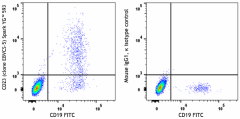
-

Human peripheral blood lymphocytes were surface stained with anti-human CD19 (clone HIB19) FITC and anti-human CD23 (clone EBVCS-5) Spark YG™ 593 (left), or mouse IgG1, κ Spark YG™ 593 isotype control (right).
| Cat # | Size | Price | Quantity Check Availability | Save | ||
|---|---|---|---|---|---|---|
| 338531 | 25 tests | $147 | ||||
| 338532 | 100 tests | $375 | ||||
CD23 is a 45 kD protein, also known as Leu-20, FcεRII, IgE Fc receptor, BLAST-2, B6, and low affinity IgE receptor. It is a member of the Ig family, expressed on most mature B cells, B cells in follicular mantle (but not in proliferating germinal center cells, follicular dendritic cells, monocytes, eosinophils, Langerhans cells, and a subset of T cells (10-15% of tonsillar T cells). CD23 responds to high levels of IgE by downregulating IgE secretion. In human monocytes, CD23 triggering results in release of pro-inflammatory cytokines including TNF-α, IL-1, IL-6, and GM-CSF. CD23 can be proteolytically cleaved to generate soluble CD23 fragments of various molecular weights. In chronic lymphocytic leukemia, levels of soluble CD23 in the serum can be used as a prognostic marker to identify patients at high risk for disease progression. Alternate splicing of exon 2 can also generate two cell-surface isoforms of CD23 differing by 6 amino acids in their cytoplasmic region.
Product DetailsProduct Details
- Verified Reactivity
- Human
- Antibody Type
- Monoclonal
- Host Species
- Mouse
- Formulation
- Phosphate-buffered solution, pH 7.2, containing 0.09% sodium azide and BSA (origin USA)
- Preparation
- The antibody was purified by affinity chromatography and conjugated with Spark YG™ 593 under optimal conditions.
- Concentration
- Lot-specific (to obtain lot-specific concentration and expiration, please enter the lot number in our Certificate of Analysis online tool.)
- Storage & Handling
- The antibody solution should be stored undiluted between 2°C and 8°C, and protected from prolonged exposure to light. Do not freeze.
- Application
-
FC - Quality tested
- Recommended Usage
-
Each lot of this antibody is quality control tested by immunofluorescent staining with flow cytometric analysis. For flow cytometric staining, the suggested use of this reagent is 5 µL per million cells in 100 µL staining volume or 5 µL per 100 µL of whole blood. It is recommended that the reagent be titrated for optimal performance for each application.
* Spark YG™ 593 has a maximum excitation of 573 nm and a maximum emission of 593 nm. - Excitation Laser
-
Green Laser (532 nm)/Yellow-Green Laser (561 nm)
-
Application References
(PubMed link indicates BioLegend citation) -
- Sugden B and Metzenberg S. 1983. J. Virol. 46:800-807.
- RRID
-
AB_3097486 (BioLegend Cat. No. 338531)
AB_3097486 (BioLegend Cat. No. 338532)
Antigen Details
- Structure
- Ig family member, type II transmembrane glycoprotein, 45 kD
- Distribution
-
B cells, follicular dendritic cells, monocytes, eosinophils, a subset of T cells, Langerhans cells
- Function
- Regulation of IgE synthesis in human monocytes; CD23 triggering results in release of pro-inflammatory cytokines including TNF-a, IL-1, IL-6, and GM-CSF
- Ligand/Receptor
- IgE, CD19/CD21/CD81
- Cell Type
- B cells, Dendritic cells, Eosinophils, Langerhans cells, Monocytes, T cells
- Biology Area
- Immunology
- Molecular Family
- CD Molecules, Fc Receptors
- Antigen References
-
1. Ludin C, et al. 1987. EMBO J. 6:109.
2. Delespesse G, et al. 1992. Immunol. Rev. 125:77.
3. Flores-Romo L, et al. 1993. Science 261:1038.
4. Armant M, et al. 1994. J. Exp. Med. 180:1005. - Gene ID
- 2208 View all products for this Gene ID
- UniProt
- View information about CD23 on UniProt.org
Related FAQs
Other Formats
View All CD23 Reagents Request Custom Conjugation| Description | Clone | Applications |
|---|---|---|
| Purified anti-human CD23 | EBVCS-5 | FC,IP |
| FITC anti-human CD23 | EBVCS-5 | FC |
| PE anti-human CD23 | EBVCS-5 | FC |
| APC anti-human CD23 | EBVCS-5 | FC |
| PE/Cyanine7 anti-human CD23 | EBVCS-5 | FC |
| PerCP/Cyanine5.5 anti-human CD23 | EBVCS-5 | FC |
| APC/Cyanine7 anti-human CD23 | EBVCS-5 | FC |
| Brilliant Violet 421™ anti-human CD23 | EBVCS-5 | FC |
| FITC anti-human CD23 | EBVCS-5 | FC |
| TotalSeq™-A0897 anti-human CD23 | EBVCS-5 | PG |
| TotalSeq™-C0897 anti-human CD23 | EBVCS-5 | PG |
| TotalSeq™-B0897 anti-human CD23 | EBVCS-5 | PG |
| PE anti-human CD23 | EBVCS-5 | FC |
| PE/Cyanine7 anti-human CD23 | EBVCS-5 | FC |
| PerCP/Cyanine5.5 anti-human CD23 | EBVCS-5 | FC |
| TotalSeq™-D0897 anti-human CD23 | EBVCS-5 | PG |
| APC anti-human CD23 | EBVCS-5 | FC |
| GMP FITC anti-human CD23 | EBVCS-5 | FC |
| GMP PE anti-human CD23 | EBVCS-5 | FC |
| GMP APC anti-human CD23 | EBVCS-5 | FC |
| Spark YG™ 593 anti-human CD23 | EBVCS-5 | FC |
| Spark Violet™ 423 anti-human CD23 | EBVCS-5 | FC |
| PE/Fire™ 700 anti-human CD23 | EBVCS-5 | FC |
Compare Data Across All Formats
This data display is provided for general comparisons between formats.
Your actual data may vary due to variations in samples, target cells, instruments and their settings, staining conditions, and other factors.
If you need assistance with selecting the best format contact our expert technical support team.
-
Purified anti-human CD23
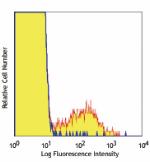
Human peripheral blood lymphocytes stained with purified EBV... -
FITC anti-human CD23
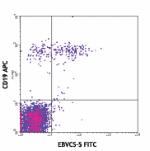
Human peripheral blood lymphocytes stained with CD19 APC and... -
PE anti-human CD23
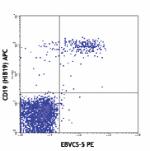
Human peripheral blood lymphocytes stained with CD19 (HIB19)... -
APC anti-human CD23
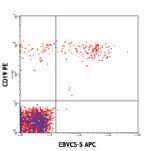
Human peripheral blood lymphocytes stained with CD19 PE and ... -
PE/Cyanine7 anti-human CD23

Human peripheral blood lymphocytes stained with CD19 (HIB19)... -
PerCP/Cyanine5.5 anti-human CD23

Human peripheral blood lymphocytes were stained with CD19 AP... -
APC/Cyanine7 anti-human CD23

Human peripheral blood lymphocytes were stained with CD19 PE... -
Brilliant Violet 421™ anti-human CD23
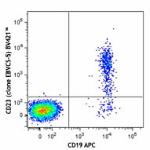
Human peripheral blood lymphocytes were stained with CD19 AP... 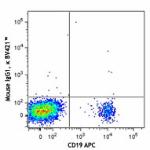
-
FITC anti-human CD23
Typical results from human peripheral blood lymphocytes stai... -
TotalSeq™-A0897 anti-human CD23
-
TotalSeq™-C0897 anti-human CD23
-
TotalSeq™-B0897 anti-human CD23
-
PE anti-human CD23
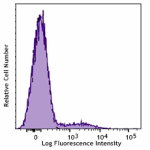
Typical results from human peripheral blood lymphocytes stai... -
PE/Cyanine7 anti-human CD23

Typical results from human peripheral blood lymphocytes stai... -
PerCP/Cyanine5.5 anti-human CD23
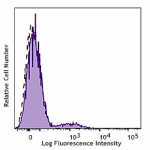
Typical results from human peripheral blood lymphocytes stai... -
TotalSeq™-D0897 anti-human CD23
-
APC anti-human CD23
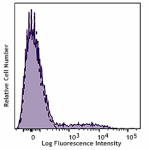
Typical results from human peripheral blood lymphocytes stai... -
GMP FITC anti-human CD23
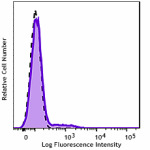
Typical results from human peripheral blood lymphocytes stai... -
GMP PE anti-human CD23

Typical results from human peripheral blood lymphocytes stai... -
GMP APC anti-human CD23
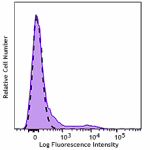
Typical results from human peripheral blood lymphocytes stai... -
Spark YG™ 593 anti-human CD23

Human peripheral blood lymphocytes were surface stained with... -
Spark Violet™ 423 anti-human CD23

Human peripheral blood lymphocytes were stained with anti-hu... -
PE/Fire™ 700 anti-human CD23

Human peripheral blood lymphocytes were stained with anti-hu...

 Login/Register
Login/Register 










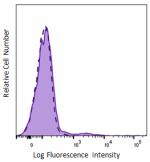



Follow Us